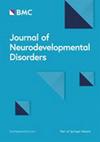Commonly used genomic arrays may lose information due to imperfect coverage of discovered variants for autism spectrum disorder
IF 4
2区 医学
Q1 CLINICAL NEUROLOGY
引用次数: 0
Abstract
Common genetic variation has been shown to account for a large proportion of ASD heritability. Polygenic scores generated for autism spectrum disorder (ASD-PGS) using the most recent discovery data, however, explain less variance than expected, despite reporting significant associations with ASD and other ASD-related traits. Here, we investigate the extent to which information loss on the target study genome-wide microarray weakens the predictive power of the ASD-PGS. We studied genotype data from three cohorts of individuals with high familial liability for ASD: The Early Autism Risk Longitudinal Investigation (EARLI), Markers of Autism Risk in Babies-Learning Early Signs (MARBLES), and the Infant Brain Imaging Study (IBIS), and one population-based sample, Study to Explore Early Development Phase I (SEED I). Individuals were genotyped on different microarrays ranging from 1 to 5 million sites. Coverage of the top 88 genome-wide suggestive variants implicated in the discovery was evaluated in all four studies before quality control (QC), after QC, and after imputation. We then created a novel method to assess coverage on the resulting ASD-PGS by correlating a PGS informed by a comprehensive list of variants to a PGS informed with only the available variants. Prior to imputations, None of the four cohorts directly or indirectly covered all 88 variants among the measured genotype data. After imputation, the two cohorts genotyped on 5-million arrays reached full coverage. Analysis of our novel metric showed generally high genome-wide coverage across all four studies, but a greater number of SNPs informing the ASD-PGS did not result in improved coverage according to our metric. Limitations. The studies we analyzed contained modest sample sizes. Our analyses included microarrays with more than 1-million sites, so smaller arrays such as Global Diversity and the PsychArray were not included. Our PGS metric for ASD is only generalizable to samples of European ancestries, though the coverage metric can be computed for traits that have sufficiently large-sized discovery findings in other ancestries. We show that commonly used genotyping microarrays have incomplete coverage for common ASD variants, and imputation cannot always recover lost information. Our novel metric provides an intuitive approach to reporting information loss in PGS and an alternative to reporting the total number of SNPs included in the PGS. While applied only to ASD here, this metric can easily be used with other traits.由于发现的自闭症谱系障碍变异的覆盖范围不完善,常用的基因组阵列可能会丢失信息
研究表明,常见的遗传变异在 ASD 遗传性中占很大比例。然而,利用最新发现的数据生成的自闭症谱系障碍多基因评分(ASD-PGS)尽管报告了与自闭症和其他自闭症相关性状的显著关联,但其解释的方差却小于预期。在此,我们研究了目标研究全基因组微阵列的信息丢失在多大程度上削弱了 ASD-PGS 的预测能力。我们研究了三个队列的基因型数据,这三个队列均为 ASD 高家族遗传率人群:早期自闭症风险纵向调查 (EARLI)、婴儿自闭症风险标记-学习早期体征 (MARBLES) 和婴儿脑成像研究 (IBIS),以及一个基于人群的样本--探索早期发展第一阶段研究 (SEED I)。研究人员在不同的芯片上对个体进行了基因分型,基因分型的位点从 100 万到 500 万不等。在质量控制(QC)之前、QC 之后和估算之后,对所有四项研究中涉及发现的前 88 个全基因组提示性变异的覆盖率进行了评估。然后,我们创建了一种新方法,通过将以全面变异列表为依据的 PGS 与仅以可用变异为依据的 PGS 进行关联,来评估由此产生的 ASD-PGS 的覆盖率。在估算之前,四个队列中没有一个队列直接或间接覆盖了测量基因型数据中的所有 88 个变异体。经过估算后,在 500 万个阵列上进行基因分型的两个队列达到了全覆盖。我们的新指标分析表明,所有四项研究的全基因组覆盖率普遍较高,但根据我们的指标,为 ASD-PGS 提供更多 SNPs 并没有提高覆盖率。局限性。我们分析的研究样本量不大。我们的分析包括超过 100 万个位点的微阵列,因此没有包括 Global Diversity 和 PsychArray 等较小的阵列。我们针对 ASD 的 PGS 指标只适用于欧洲血统的样本,但对于在其他血统中有足够大发现的性状,也可以计算覆盖率指标。我们的研究表明,常用的基因分型微阵列对常见的 ASD 变异的覆盖率并不完全,而且估算并不总能恢复丢失的信息。我们的新指标为报告 PGS 中的信息丢失提供了一种直观的方法,也为报告 PGS 中包含的 SNP 总数提供了一种替代方法。虽然在此仅适用于 ASD,但这一指标可轻松用于其他性状。
本文章由计算机程序翻译,如有差异,请以英文原文为准。
求助全文
约1分钟内获得全文
求助全文
来源期刊
CiteScore
7.60
自引率
4.10%
发文量
58
审稿时长
>12 weeks
期刊介绍:
Journal of Neurodevelopmental Disorders is an open access journal that integrates current, cutting-edge research across a number of disciplines, including neurobiology, genetics, cognitive neuroscience, psychiatry and psychology. The journal’s primary focus is on the pathogenesis of neurodevelopmental disorders including autism, fragile X syndrome, tuberous sclerosis, Turner Syndrome, 22q Deletion Syndrome, Prader-Willi and Angelman Syndrome, Williams syndrome, lysosomal storage diseases, dyslexia, specific language impairment and fetal alcohol syndrome. With the discovery of specific genes underlying neurodevelopmental syndromes, the emergence of powerful tools for studying neural circuitry, and the development of new approaches for exploring molecular mechanisms, interdisciplinary research on the pathogenesis of neurodevelopmental disorders is now increasingly common. Journal of Neurodevelopmental Disorders provides a unique venue for researchers interested in comparing and contrasting mechanisms and characteristics related to the pathogenesis of the full range of neurodevelopmental disorders, sharpening our understanding of the etiology and relevant phenotypes of each condition.

 求助内容:
求助内容: 应助结果提醒方式:
应助结果提醒方式:


